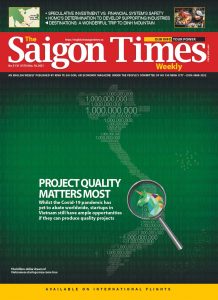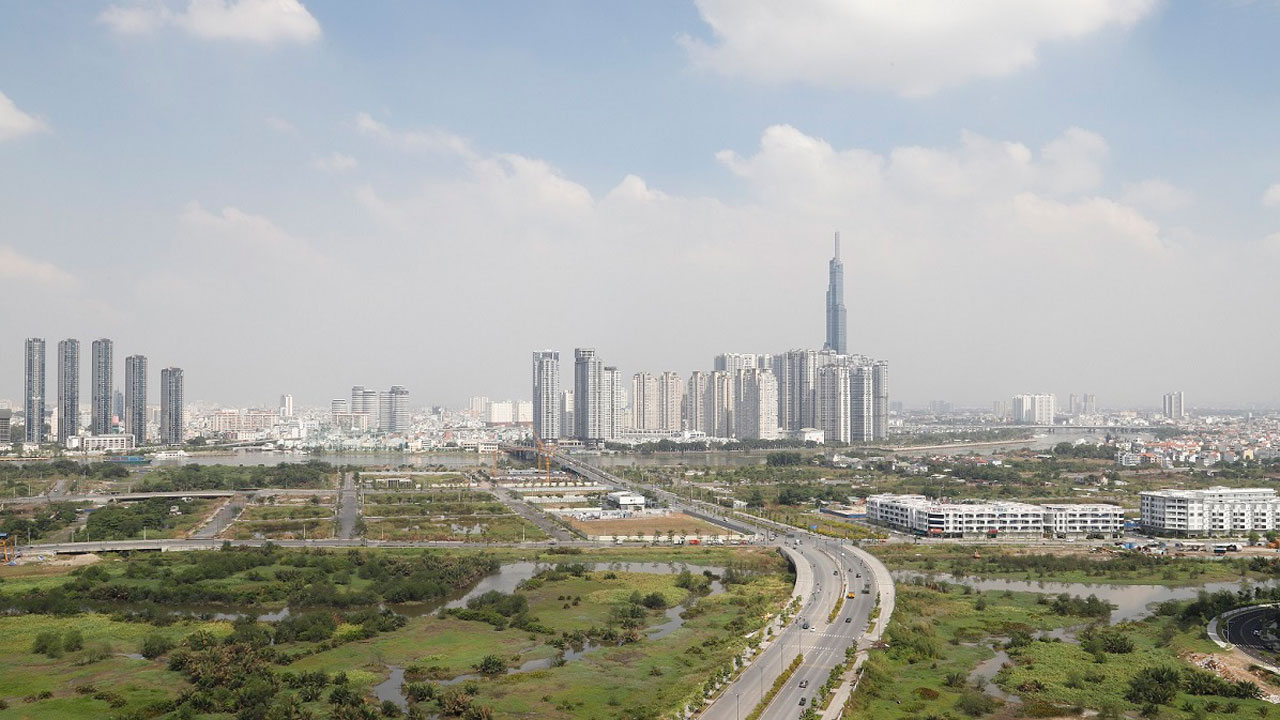The bidding for some swathes of “golden land” in Thu Thiem peninsula in HCMC has resulted in huge collection worth billions of U.S. dollars for the State budget. The colossal amount has once again testified to the remark that any land price record in this peninsula can be shattered after a while. Given the average of VND2.4 billion (more than US$100,000) per square meter offered at the auction, many have posed questions as to what the new landlord would do business on the land he has bid for. At the same time, people wonder how the market would be impacted after the auction held last week that set new highs for land prices in HCMC.
Since the auction ended, Ngoi Sao Viet, a realty company which is a subsidiary of Tan Hoang Minh Group, has obtained more than 10,000 square meters of land in Thu Thiem. And what it has to pay is equivalent to the total chartered capital of a medium-sized commercial bank. What will the company do to make profit with the swathes of land whose prices are even way higher than the dearest land plots right in the heart of HCMC?
In reality, the prices for real estate on Nguyen Hue or Dong Khoi streets in the city’s central business district, considered the dearest in HCMC, are currently at VND1.8-2 billion per square meter. Land prices are always associated with location and the services available in connection with the land project. That is why only the city’s CBD whose vicinity has already amassed luxury hotels, top-notched complexes and busy services and business are considered scanty and attain such high prices.
What business to be done after the auction?
An executive of a realty firm in HCMC said based on the 1/500 scale planning map, the swathe of land won by Tan Hoang Minh has a gross floor area (GFA) of 90,000 square meters, a land-use coefficient of 8.95 times and the projected number of apartments of 570 units.
Therefore, on average the price of each apartment would be VND42.9 billion, or VND340 million per square meter on GFA of 80%. This unit price does not include construction costs and profit. To attain the expected profit, the quotation of an apartment of the project on the swathe of land must be as high as almost VND500 million per square meter.
Quite a few realty businesses that are veterans in the field have cast doubt on the prices and profitability of the project as well as the development plans of the successful bidder. According to these realty firms, in estate products, land costs will decide selling prices.
Currently, considering high-end apartments in Thu Thiem area which are quoted at VND110-120 million per square meter, and a middle-end apartment at VND80-90 million per square meter, the total price is between VND8 billion and VND10 billion per unit. A rough estimate shows that an apartment in the swathe of land successfully bid in Thu Thiem may cost VND40 billion, which is a real challenge as far as potential homebuyers are concerned.
It is possible that the successful bidder would try to opt for super luxury services, such as six- or seven-star hotels, and top convention centers once Thu Thiem has become a regional financial center. However, the segment of ultra-luxury condos in Vietnam has existed, providing a wide range of selection while the number of customers who can afford them remains small. Therefore, product development and positioning should require developers to exercise caution and careful scrutiny in the long run.
Moreover, some said the developer involved may cut the cost price by applying for a modified plan, such as building more stories and paying for additional fees. However, given the current context that local governments across the country are becoming very tough on revisions of approved planning, this possibility is extremely unlikely. If the developer scales down the surface area of apartments (the planned population is 3,420 people), the smaller sizes will make luxury realty products less attractive.
How the successful bidder will position their products in the future may be a hard question because one of the inputs—land costs—has already far exceeded the highest level on the market. Obviously, however, the State is the biggest beneficiary from the auction when it is to bag VND37,346 billion from the three hectares of land on offer.
 Unknown effects on the market
Unknown effects on the market
Although the State and some State-owned enterprises are upbeat about the results of the auction, many other stakeholders are worried. The exorbitantly high land prices will make life harder for them when they have to seek land funds for housing projects in the future.
Proof of this argument is the fact that dozens of bidders in the aforesaid auction quit midway as they could not make it to the end.
The successful bid for the lots of land in Thu Thiem area at prohibitive prices will serve as the new benchmarks for project proprietors to go ahead with higher offers in the coming time. That means more homebuyers cannot afford a house or an apartment. At the same time, the higher land prices may prompt people to request higher compensation for their land to be used to build new housing projects. That will be another dilemma for estate developers.
Furthermore, the new land prices of the swathes in Thu Thiem may become an important yardstick with which realty projects in HCMC revise up their prices, which may push up the overall price on HCMC’s realty market, and at the same time prompt State agencies to set higher prices for calculation of land-use fees or land rents. However, based on the price offers for the swathes of “golden land” in Thu Thiem on December 10, each square meter of the “golden land” in Thu Thiem was already VND600 million if the lowest price was applied.
In this case, proprietors of new realty projects that have only paid advances for land-use fees but have sold their products, and projects that have not calculated their land-use fees in Thu Thiem must be worried because they may have to pay amounts far exceeding their initial advances.
Last but not least, the results of the auction will strongly affect the overall land price in the area of Thu Thiem and its vicinity. According to the worst-case scenario, without strong warnings and effective management of relevant State agencies and experts, an estate bubble is quite feasible. One of its consequences is that low-cost housing projects will disappear in the development plans of estate companies.
According to Le Hoang Chau, chairman of the HCMC Real Estate Association (HOREA), similar to the principle of communicating vessels, the realty market will see the rising prices in a segment pulling along those in another. In this case, an unwanted consequence would be difficulty in fulfilling the aim to develop low-cost housing as input costs, which is land price, has risen to a new level.
“Offering a high bidding may represent the investors’ expectations of the future of Thu Thiem, and they must have had their own plans,” said Mr. Chau. “However, when the prices become incredibly high, they will partly adversely affect investment in Thu Thiem in the future as the area has been projected to become Vietnam’s financial center.” He added that it will be a story of actual effects and the implementation process after the auction, from payments to steps taken to develop the project. Only when the process is on schedule will the auction be really successful. “Currently, these are still open questions,” said Mr. Chau.
To address this issue, some industry experts have contended that it is necessary to solve the problem of development benefit in order to ensure social justice. The State may gain hugely from the auctions of the swathes of “golden land.” However, the money collected should be partly allocated for investment in social or low-cost housing projects.









